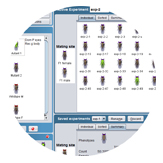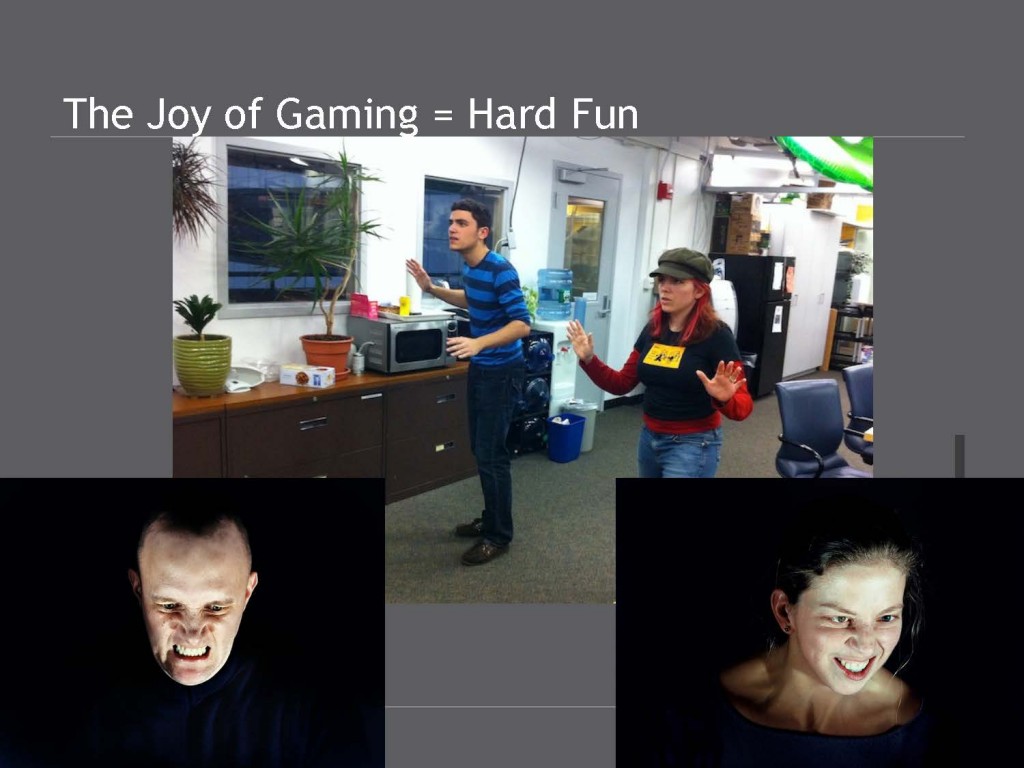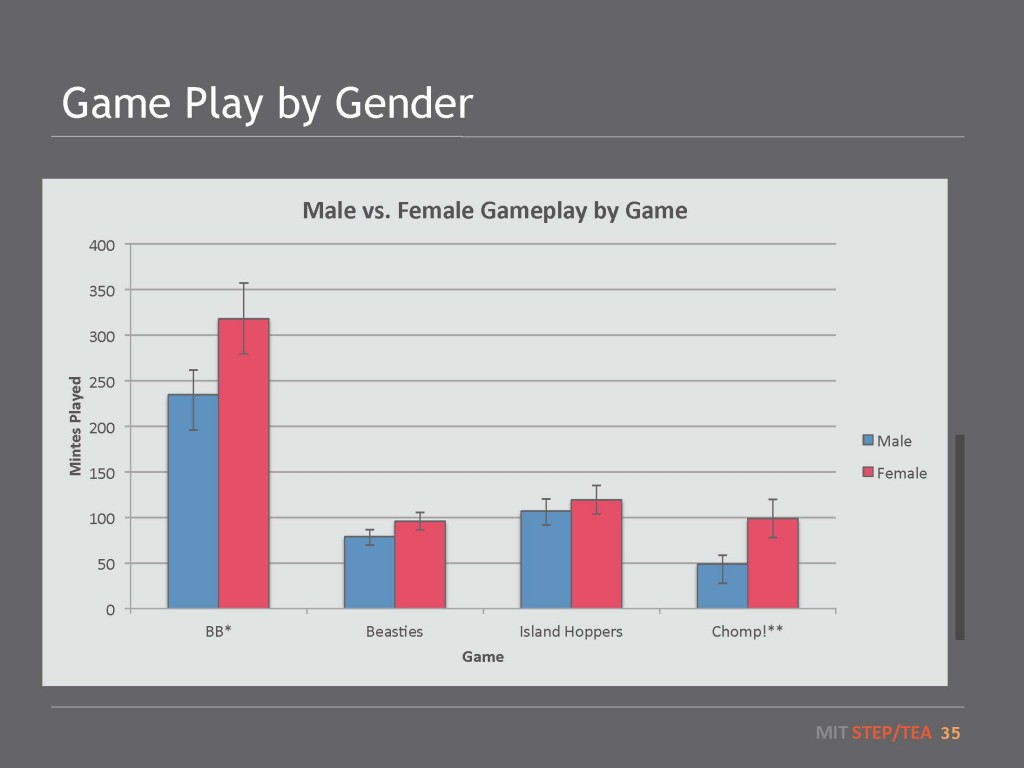 Professor Eric Klopfer
Professor Eric Klopfer
Title: Learning Games are Hard Fun
Seminar Date & Time: Friday, February 1, 2013 @ 1:30 pm
View the slides from Professor Klopfer’s Seminar
Listen to the audio from Professor Klopfer’s Seminar
Eric Klopfer is Professor and Director of the Scheller Teacher Education Program (STEP) and The Education Arcade (TEA) at MIT. Professor Klopfer is also the co-founder and President of the non-profit Learning Games Network. Professor Klopfer’s research focuses on the development and use of computer games and simulations for building understanding of science and complex systems.
In Eric’s seminar titled, “Learning Games are Hard Fun,” he animatedly described how the STEP and TEA programs strive to make learning environments that are engaging and are “hard fun”. The STEP/TEA programs promote highly engaged and motivated students; provide immersive environments in which students can learn through collaborative, problem-based learning; and create game-like, active, “Hard Fun” learning settings that can be used both in and out of the classroom.
First, Professor Eric Klopfer dispelled the myth that all computer games need to be in 3D and involve shooting things. In some games, such as Math Blaster, play becomes the reward for learning, but doesn’t promote life-long learning once the “reward” or play is removed. In contrast, STEP/TEA strive to create environments in which students can learn in a playful manner and promote healthy habits of life-long learning. Ultimately, the goal is for students to realize the joy of learning.
When creating learning games, Professor Klopfer carefully considers several attributes, including feedback, learning outcomes and structure, of a successful game. Professor Klopfer carefully considers how and when feedback should be given to students in the best manner to promote playful learning. Providing feedback to students is critical, but needs to be given at the right times and with the correct amount of feedback to help student learning. All of the learning games have three specific learning goals; students will develop 1) cognitive skills, 2) non-cognitive skills such as persistence and grit, and 3) metacognitive skills such as the ability to reflect on learning. Additionally, Professor Klopfer highlighted the importance of structure in games and specifically in learning games. The provision of structure is a scaffold upon which learning can take place. The rules and structures of a particular game are actually what make a specific game challenging and therefore also fun.
During his seminar, Professor Klopfer described four different categories of learning games that he has developed: ubiquitous games (UbiqGames), massively multi-player online games (MMOG), augmented reality games, and modeling/simulation games. All of the learning games have been carefully designed and developed to fit into the confines of the school system, including not just computer lab scheduling and time during the school day, but also in the curricula. Additionally, all of the programs are web-based programs that do not require software or drivers to be downloaded, which enables the games to be implemented more easily in the high school environment.
The first category of learning games that he described was UbiqGames (ubiquitous games). UbiqGames work on mobile devices and are designed specifically for frequent use over short periods of time. One such UbiqGame is the UbiqBio Project, an NIH-funded research study to develop four standards-based, biology learning UbiqGames. The four games focus on genetics, ecology, and evolution concepts and are called Beetle Breeders, Invasion of the Beasties, Island Hoppers and Chomp!. The UbiqBio games not only have student portals, but also have an instructor portal to enable teachers to observe student play and progress and a researcher portal to collect data on student use and progress. Professor Klopfer was able to dispel a common myth that males play more games than females. The data on student use show that female students played all four of the games for more minutes than males. In a research study to assess the effectiveness of the UbiqBio games on student learning of biology concepts, Prof. Klopfer found that students who played the games had increased learning gains in Genetics compared to students who had not played with the games.
The next game that Professor Klopfer discussed was the Radix Endeavor, which is a massively multi-player online game (MMOG) for science, technology, engineering and math (STEM) learning in high schools. The Radix Endeavor is a new game under development and will be released for the first time in fall 2013. The Radix Endeavor is a collaborative effort of The Education Arcade and Filament Games. In this game, students will have a highly collaborative, social experience in which they have to solve large, complex and open-ended quests. The first prototype of the Radix Endeavor will explore concepts in biology and math.
The third category of games that Professor Klopfer discussed is Augmented Reality Games, which is a category of learning games that combines real world context in an immersive online environment. One such game is Environmental Detectives where students are asked to find the source of a toxic spill. The game is played on a GPS-enabled mobile device that students take to three different sites to solve the investigation. Through the combination of a simulated complex, real-world event and technology, Augmented Reality games, such as Environmental Detectives, actively engage students in a potentially real scientific investigation.
The last group of games that Professor Klopfer discussed is the use of simulation games, such as BioGraph, which is a graphical programming tool that helps students construct their own complex systems understanding in biology. Through this game, high school students learn about both programming and science, specifically introductory biology. By constructing their own complex systems, students learn to no longer think about concepts as discrete entities, but as dynamic, interactive concepts that create a whole system. This game has the added benefit of students gaining the opportunity to learn about computer programming to create their own programs.
All of the games that Professor Klopfer developed by STEP/TEA enable students to engage in the material in entirely new ways in comparison to a traditional classroom setting. The learning games enable particular concepts to be taught that otherwise wouldn’t even be covered. Learning games can increase the level of student understanding by engaging students in active, challenging learning environments that are HARD FUN!
In addition to the wealth of games that he has developed, Professor Klopfer has also authored or co-authored several books. He is the co-author of the book, “Adventures in Modeling: Exploring Complex, Dynamic Systems with StarLogo,” and author of “Augmented Learning: Research and Design of Mobile Educational Games” from MIT Press. He has a new book, “The More We Know“, from MIT Press, which will be released in 2013, about the intersection of academia and private industry around technology-enabled classroom innovations.





